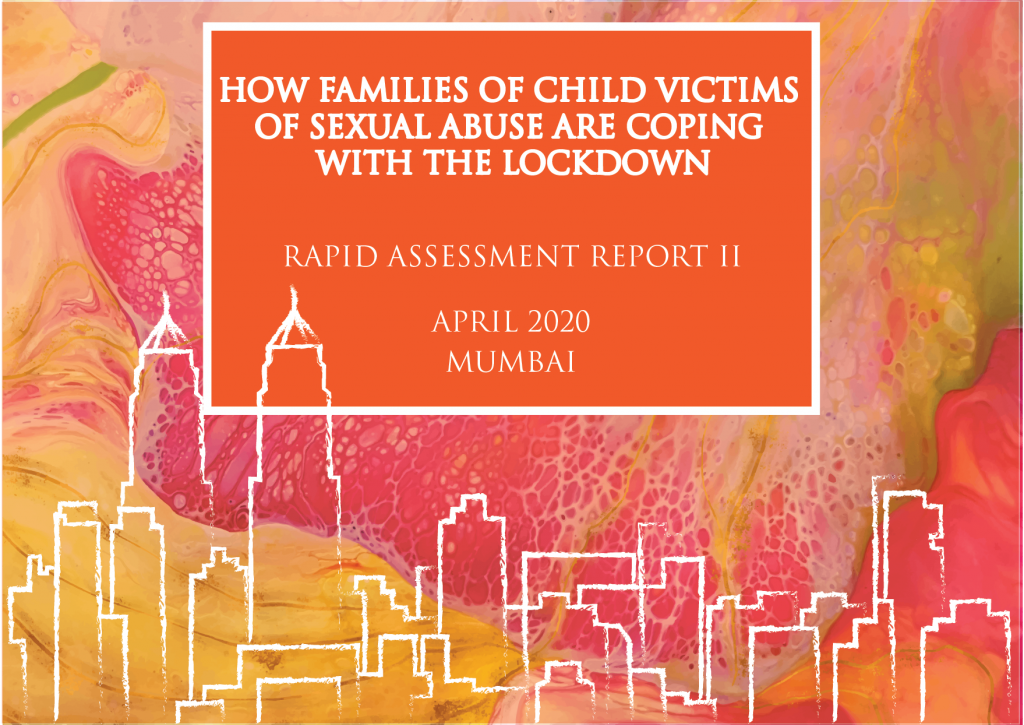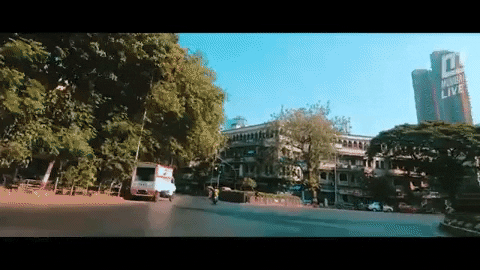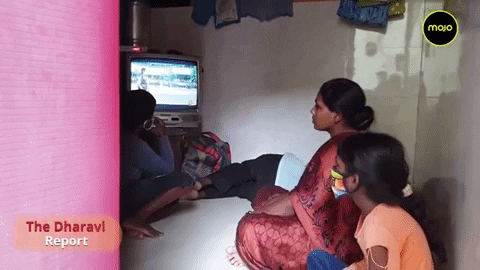Surviving, but under Stress: How Child Victims & Families are Coping with the Lockdown (Part 2)
As precarity deepens for the most vulnerable, governments need to urgently step in, step up & supplement the efforts of citizens & civil society.
The 2nd Needs Assessment Report is part of our ongoing attempt to understand the needs & requirements of the families of child victims of sexual offences in Mumbai under the lockdown. It chronicles their worries, concerns, lived realities & experiences of trying to access basic necessities, aid & relief during this period. These are families that we have been working with since 2015 as part of “Strengthening Child Protection Systems in Mumbai & Maharashtra” a project in which we work partnership with UNICEF Maharashtra.
Our first report for March 2020 captured the families of child victims of sexual offences in Mumbai in a state of shock and chaos as they tried to cope with the sudden declaration of an unprecedented lockdown. The second report for April 2020 finds them grappling with fear, stress & anxiety around the vulnerabilities of their present and the uncertainties of the near future.
Their precarity has clearly deepened. Jobs have been lost. Remittances have turned into a trickle. The choices they are forced to make are getting tighter. Can their child continue with education? Should they recharge the phone or save up for ration? Should they stay put in their homes or move out to their native places?
It is clear that people are doing their bit and pulling their load in this moment of crisis. Millions of vulnerable families have put their lives and livelihoods at risk in cooperating with the chaos of the lockdown for over two months now. Citizens and civil society are engaged in charitable activities & relief work. But the need from the ground calls for so much more.
It is essential & about time for the State & Central governments and their institutions to step up, step in and supplement the ongoing efforts of the people with a wide range of direct & accessible relief and aid. Unnecessary barriers to access must be done away with and concrete assurances about the future must be put in place. The most vulnerable deserve the highest priority and the most tangible, relevant & accessible response.
Everybody needs a little bit of help for the near future.
Some will need it more than most.
Highlights of the Rapid Assessment Report:
How Families of Child Victims of Sexual Abuse in Mumbai are Coping with the Lockdown
Part 2
(Click here to read the full report with charts)
Number of families covered: 128
Total Number of individuals (including children) in the families: 747
Total Number of children in the families: 300
- The three major challenges the families were facing as ranked by them include- 1. Current financial constraints, 2. Challenges in acquiring ration and 3. The Prospect of unemployment.
- 80% families mentioned that working members of the family did not go to work due to the lockdown. They are not expecting salaries at the end of the month.
- 66% told us that they have not received their pay even for the month of March. Some had received just half a month’s pay.
- 43% families were unsure if they would have jobs once the lockdown was lifted. Many had not heard from their employers. Those who were engaged in small businesses were unsure if they would be able to secure capital needed to restart.
- 60% families have been unable to access the free ration schemes of the Central & State Governments. This was primarily because stocks were depleted or the Aadhaar Card linkage failed. Only 5 families mentioned that they received the ration at a subsidized rate.
- Since March, there has been a 20% increase in the number of families who need ration support through our intervention
- Almost 75% families mentioned needing continued ration support for the month of May & June.
- Other than the support received from Aarambh India, 86% families have not been able to access any form of government or non-governmental support or aid. (In the last report the figure was 97%)
- Despite dwindling incomes & government schemes, 79% families mentioned that they purchase gas cylinders from authorized gas agencies for prices between Rs.700 to Rs.900.
- In a new indicator that has come to light, 23% of families are now unsure about allocating money for the recharging their cellphones for data.
- 15 families mentioned that they were unsure if they will let their children resume education, as they weren’t sure if they would be bear the educational expense.
- Many parents mentioned managing children as a big challenge. They had given up on any set routine, and they let children do whatever they wanted inside the home.
- 100% families reported followed at least the basic precautions by staying at home, wearing masks, and washing hands regularly.
Click on the links below for a Spotlight on Specific On-Ground Challenges
- 1. Families stuck in Other Districts due to the Lockdown
When we first contacted the families in March 2020, we found out that some were visiting their villages to celebrate the festival of Holi. Due to the sudden enforcement of the lockdown, these families were stranded in their villages with no means to return to Mumbai. While few had their own houses in the village, most of them were visiting their relatives and due to the lockdown have been dependent on their relatives for the past 2 months.
Challenges faced by families
– Even though these families have ration cards, they are registered to their Mumbai addresses and cannot avail of the ration being distributed in the villages.
– In a few cases, the villages where families were stranded are in interior and less developed parts of districts. They have limited access to ATMs and banking systems, because of which they have not been able to access the money in their bank accounts.
– The shops in their village did not have online payment facilities nor were the shopkeepers comfortable with direct transfers to their bank accounts. This presented a significant challenge in supporting these families.Strategies used to overcome the challenges
– In order to support families, we followed established convergence models and reached out to the child protection functionaries and NGOs in districts in order to acquire support:
– For the family stuck in the interiors of Ratnagiri district in Maharashtra, we reached out to the Child Welfare Committee chairperson of the district with a request to assist us in supporting the family. The chairperson directed the Probation officer and the counsellor from the District Child Protection Unit to provide aid to the family. With the consent of the family, we connected the family with the CWC and DCPU of the district and the family was provided with basic ration supply for 1 month.
– For another family stuck in a small village of Hanumangarh district in Rajasthan, we approached the NGO Vishakha, who helped us in connecting the family to the Sarpanch of their village. The Sarpanch of the village had been providing people with ration in their village, who supported the family with ration supply for 15 day periods.
- 2. Families who Migrated out of Mumbai before the Lockdown
Some families we worked with had left Mumbai and migrated back to their villages or other districts prior to the pandemic and the lockdown.
Challenges faced by the families
– They had not changed the addresses on their ration card post the migration, due to which they were unable to access public ration in the new districts.
– The ration shops did not have sufficient ration to meet the needs of all the residents of the village even as they were directed by government schemes to provide the same.Strategies used to overcome the challenges
– We initially attempted to link them with a local resource that maybe would be able to provide necessary aid & support.
– However after coordinating and mapping of resources, when it emerged that such aid would not be possible; we directly supported the procurement of their ration.
- 3. Families put under Quarantine
In the month of April 2020, following the detection of a positive case of Covid-19 in their neighborhood in the western suburbs of Mumbai, one family consisting of 4 members (including the victim child) were placed in a quarantine centre by the Municipal Corporation.
Challenges Faced by the families
– All the residents of the neighborhood were displaced from their homes and quarantined at a hotel in the nearby vicinity without any prior notice. The families did not have enough time to prepare and pack their essentials nor were they provided with comprehensive information about the process and procedures to be followed.
– The family mentioned they faced issues in terms of quantity, quality and timing of the food being provided to them during quarantine. One of the members of the family had recently undergone a brain surgery and was required to take their food and medicines in a timely manner.
– The families reported unhygienic conditions in the rooms they were placed in. They were not provided with cleaning kits that they could use to keep their rooms and toilet cleans. Even procurement of the kits was challenging.
– Because of a lack of information & because they were being referred to by personnel at the centre as ‘patients’, the families believed that they had already caught the infection which caused panic.Strategies used to overcome the challenges
– We contacted the Municipal Corporation helpline and were provided with contact details of the Chief Development officer (CDO) and the Medical Officer (MO) of the ward.
– We gathered all the information w.r.t the process, procedure of the family being quarantined, raised the challenges faced by the families. The MO informed and updated us with the procedures and process of quarantine. The CDO noted the food related challenges and assured that it would be sorted.
– We kept in contact with the MO of the ward on a regular basis to understand the timelines and the protocols that were being followed and kept the family updated.
– As the family was distressed and showed signs of stress, they were referred to our counsellor immediately to provide mental health support, which is being continued even after the family was released from the quarantine.
- 4. Unaccompanied Minors
The above mentioned family that was quarantined in the hotel also informed us that there were 5 minors who were in quarantine without their parents. Their parents had not been at home when the neighborhood was being taken to the quarantine center. We were further informed that the eldest sibling (a 16 year old girl child) had to take care of her younger siblings that aged 3 years, 6 years, 11 years and 14 years.
We began our intervention with phone-based basic psycho-social aid. The counselor initiated telephonic sessions with the children and they were continued as long as they were in quarantine. We tried to trace contact details of the children’s parents but were unable to do so. Our point of contact, the aforementioned family in quarantine, worked with us & supported us by checking in on the well-being of these 5 children on a regular basis.
Once the children were released from the quarantine and restored home, the counselor has continued the telephonic counselling sessions with the children, while the social workers followed up with the parents in order to make sure that the family and children were safe and taking the required precautions.
- 5. Legal status of the POCSO Cases
73% families are still engaged in ongoing POCSO cases pending at various stages at the Sessions courts or the Juvenile Justice Board.
Due to the pandemic and ensuing lockdown, the courts have been functioning for two to three days in the week via Video Conferencing. The courts have only been hearing matters that they deem as emergency cases. None of our cases have proceeded since the lockdown. This has resulted in increased anxiety among some victims & families w.r.t how long will it take for the cases the reach their conclusion & how long they will have to be involved.
It was conveyed to the families that the Supreme court had passed an order stating that the court could not penalize any individual for not appearing before the court during the time of the lockdown. But the families are under constant worry and fear that since they are unable to be present in the court, the courts would pass an order that is not in their favour. We are constantly following up on each case via the court website and keep the families updated about the status of hearing and the next court date.
- 6. Children placed in Child Care Institutions
While following up with the families of the children who were institutionalized, one common concern that we were alerted to by the families was that due to the lockdown they were unable to visit the CCI and meet the children. Further they were unaware of the protocol being followed by the CCI and therefore did not know when they may call to speak with the child.
On the other hand, the CCI staff informed that the children were concerned about the whereabouts of their families due to COVID19 and if they were safe and healthy. They mentioned that since they had not spoken to their families for more than a month, they were worried. In order to bridge this gap, we worked with both the CCI and the children’s families to facilitate phone calls so that the parents may speak with the child.
The Social workers were unable to speak with the children during the lockdown over the phone, but follow up with the CCI staff on a regular basis to understand & keep track of the wellbeing of the child.
- 7. Psycho-Social Support for Families
One of the key components of our case management is the psycho-social support that is provided to child victims. In the light of the COVID 19 pandemic we have realized that we needed to expand the support to include not just the child but also the family members.
The social workers continued to follow-up with the families in order to make sure they were healthy, safe and had access to all the basic essentials required. The counselor continued the sessions not just with the child victims but also some of the family members. Based on the assessed need, the counselor decided on taking sessions either every alternate day, twice every week, once in a week, once every fortnight or once a month. Detailed notes of the sessions and reports of the follow-ups are maintained by the counselor and social workers to aid in the planning for the subsequent sessions and follow-ups.
- 8. Need for Urgent Government Aid
As mentioned above, one of our efforts during the lockdown has been to connect the families with local support systems where they can access relief, aid and support. It was always encouraging and inspiring to come across individuals and institutions working in the remotest of localities. Also, as we experienced through our online fundraising page, the citizens have been opening their hearts and donated to aid.
However in the last few weeks, the need from the ground has turned relentless. Some of the organizations that we reached out to mentioned that they been consolidating instead of expanding. Even at Aarambh, we have been unable to look beyond the existing families. Our existing activities our focused on keeping the families secure till the lockdown opens with basic necessities. Once, the lockdown opens and the families attempt to get back to their lives and livelihoods, the range and scope of what they will require to sustain will be much larger.
It is essential & about time for the governments to step in and supplement their efforts with a wide range of direct & accessible relief and aid so that the most vulnerable families & most vulnerable areas are cared for in a sustainable manner.

















